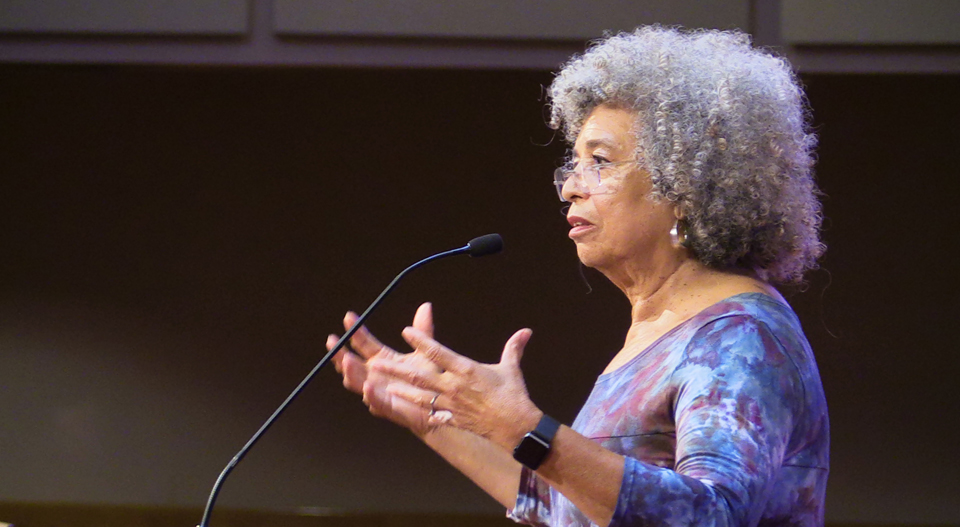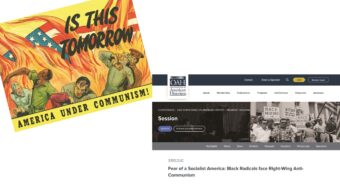
CHICAGO– “The function of freedom is to free someone else.”- Toni Morrison
These words were also evoked by radical activist, philosopher, and professor Dr. Angela Davis at the recent celebration of the 45th anniversary of the founding of The National Alliance Against Racist and Political Repression. Founded in 1973, it is an organization that grew out of the mass movement to free Angela Davis and other political prisoners at the time of its inception.
Davis had been charged with murder in a frame-up after the aborted attempt by Jonathan Jackson to free his brother, George Jackson, and the Soledad Brothers in 1970. Dr. Davis was the keynote speaker at the 45th anniversary celebration, as the program focused on looking back at the victories of the movement around combating police brutality and political repression, while addressing the continued fight against police misconduct, torture, and racism in the United States and around the world.
Chaired by Chicago Alliance Against Racist and Political Repression (CAARPR) leader Frank Chapman, the program highlighted police torture victims and their families, bringing attention to current cases. One of those cases was that of Gerald Reed.
Armanda Shackleford, Reed’s mother, took to the podium to testify about her son’s 27 year struggle in the criminal justice system. On October 3, 1990 Reed was arrested and questioned regarding two murders. Shackleford described how her son was beaten by police and pressured into giving a confession to a crime he did not commit. Reed repudiated the confession at his trial, and has maintained his innocence ever since.
The Illinois Torture Inquiry and Relief Commission held, in a decision in 2012 and 2014, that there was “preponderance of evidence” that Reed had been tortured and forced to confess. Reed remains in jail with lasting injuries from his alleged torture at the hands of police. The CAARPR has a number of demands regarding the Reed case. One is that the Cook County Special Prosecutor drop all charges against Reed and move to secure from the court a certificate of his innocence.
Speaking to the resilience of the movement, and her drive for continued justice for her son for the past 27 years, Shackleford proclaimed, “I thank God that I’m still here. I have aches and pains now, but I am still here, and my son is still here.” Speaking to the need for a Civilian Police Accountability Council (CPAC) that will be empowered to hold police accountable for the crimes they commit and to control and decide how their communities are policed, Shackleford said, “Talk to your Alderpeople, get in contact with that so-called Mayor [Rahm Emanuel], and let them know. We need CPAC!”
Highlighting the need for unity across racial communities, Hatem Abudayyeh of the Arab American Action Network and The United States Palestinian Community Network, expressed that the current White House administration was seeking to divide communities to make the movement for justice weaker. “We are in complete solidarity and support for the movement of Black lives in this country. The struggle against police crimes knows no political party. We know that the current mayor [Rahm Emanuel] tried to cover up the killing of Laquan McDonald… We also know that we are living in the era of Trump. The most racist, sexist, homophobic, anti-immigrant, anti-worker president we’ve ever had. There is an actual white supremacist in the White House,” Abudayyed said. “Arabs and Palestinians know torture as well. Our people have faced torture for years by the Israeli government in our homeland of Palestine… I know our community has some challenges to unity but we are making great progress with our solidarity with each other.”
Black Lives Matter Chicago leader Aislinn Pulley spoke about current struggles in Chicago and looking to history for strength. Speaking to the fight in the city against the $95 million police and fire training academy pushed by Mayor Rahm Emanuel, Pulley proclaimed, “We say no more divestment from our communities. [Mayor] Emanuel closed over 50 schools and mental healthcare centers, and there’s no way we’re going to allow a $95 million police academy in our city.” Pulley added, “We have the power and strength to move this moment forward… Who won the first reparations for torture survivors ordinance in the country? We did that. We have to continue to make the connections to struggles. Such as what is happening on the border with the ICE raids, and the fact that Chicago has the largest juvenile prison in the country. We are organizing to overturn a system. When we fight, we win.”
Keynote speaker Dr. Angela Davis took to the stage and spoke on the history of the organization and the road forward. Highlighting those that have been victimized by police torture, Dr. Davis proclaimed, “I feel honored to be in the presence of these survivors of torture. I want to emphasize that we should call them survivors, not victims. We’ve learned from feminist struggle that words matter. We have to reflect on the work our vocabulary is doing. When we say victims we objectify them, and deny them their agency. When we say “survivors” we acknowledge their capacity to resist, and their strength to continue to fight against the conditions that led to the violence inflicted on them.”
Addressing the talk around criminal justice reform, Dr. Davis said, “I don’t think we should talk about criminal justice reform anymore. Whenever we witness these horrors we automatically call for criminal justice reform. But the criminal justice system has been reformed over and over again, and it only leads to more violence. So let’s see if we can fix our tongues to say abolition.”
“We need to also be able to recognize where we have been victorious, and where change has happened,” Dr. Davis advised. “This is the result of generations of activists in struggle. Even if we haven’t managed to undo all of the structural violence of racism we’ve learned how to better understand it. And that puts us in a better position to dismantle it,” she noted. Quoting Toni Morrison, Dr. Davis explained that, “The function of freedom is to free someone else. As individuals, our freedom is only meaningful if we use it to broaden the reach of freedom. To make others free. This has been the guiding practice behind the Chicago Alliance Against Racist and Political Repression.”
She highlighted the need for solidarity across communities in concerns regarding racism and violence. Citing the fact that eight billionaires have the same amount of wealth combined as the poorest fifty percent of the entire global population, Davis remarked, “Despite that fact people like [Donald] Trump successfully end up persuading some white people who are having difficult economic circumstances that their impoverishment is a direct result of immigrants.
“We’ve come a long way,” Davis noted, “But we haven’t come far at all.” Emphasizing the importance of global solidarity she explained, “Islamophobia has to be understood as linking to and reigniting anti-Black, anti-Latino, anti- Asian, and so on, racism. And racist violence when inflicted with misogyny is especially fatal.”
Davis concluded on an upbeat note: “I wish you success, and welcome home to the survivors of torture. We who believe in freedom, cannot rest until it comes,” she declared.
For more information regarding Chicago Alliance Against Racist and Political Repression (CAARPR) visit here.












Comments